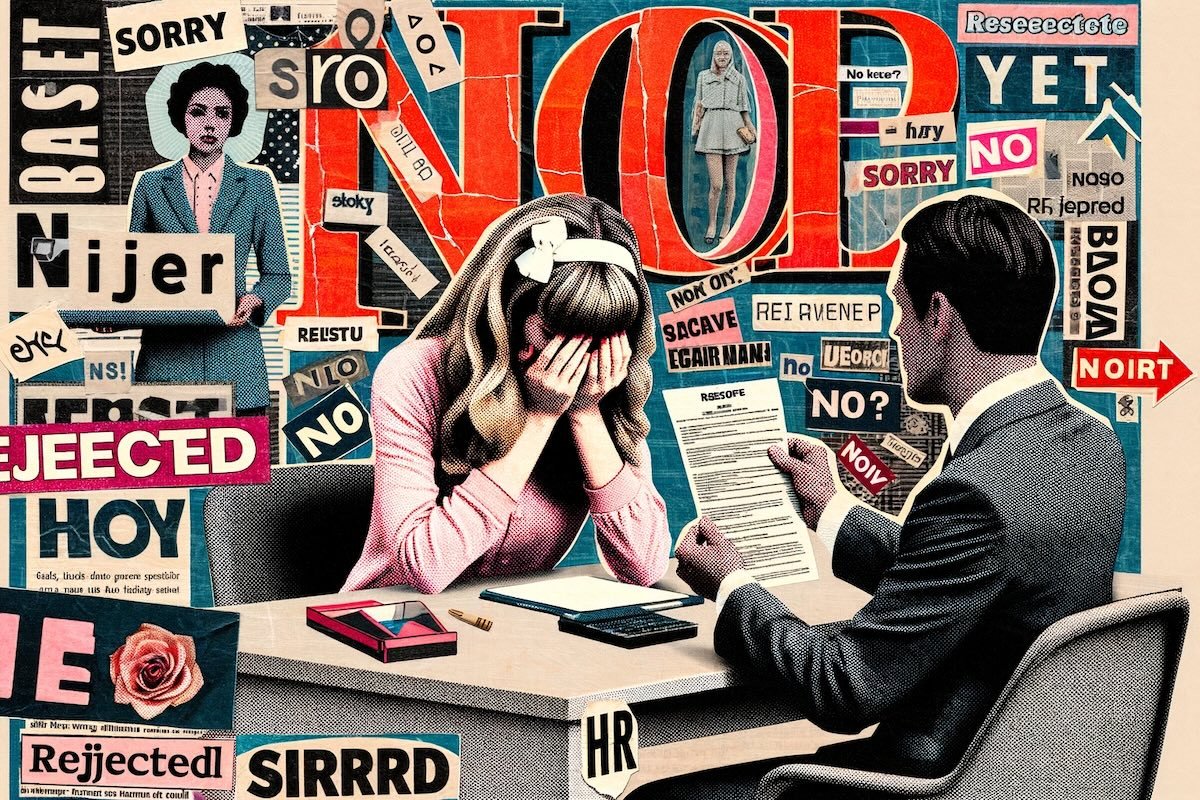Photo by Ann H from Pexels
Regardless of your industry, a job interview follows some particular patterns.
Trust us, some of the same, time-worn interview questions will show up.
There are simple openers that are the “warm-up” questions to get you into
interview mode—and you should use them as such (think succinct answers to succinct questions). Then there are the
trickier job interview questions you might encounter and they'll require thinking about the whole interview a little differently.
How to Categorize Interview Questions: Categories Over Questions
We recommend you shift your perspective: you're going to prepare answers for certain categories rather than actual questions.
Because the sequence, wording, and content will vary from interview to interview, you should focus on general topics. Doing so ensures you’re ready for whatever comes your way.
Plus, by thinking in big-picture terms for each category, your answers will ultimately come across as
more conversational and believable, which will make the interview better for everyone.
Before we dive into how to answer these common interview questions, keep these three words in mind when crafting your answers:
- Creativity
- Positivity
- Takeaways
Be creative in your answers. Ensure that you are keeping everything positive (yes, even when talking about
that boss). Finally, make sure you're sharing all that you've learned in your career—and what you're excited to continue to learn!
How to Answer the 35 Most Common Interview Questions
The interviewer is going to ask many (if not all!) of these common interview questions. That's right! Just because you hate the question, "
What's your biggest weakness?" does not mean that you can convince the interviewer to
not ask it.
Make sure you're ready to answer every question—to show that you're the perfect fit. We're here to help. We even created a series called
How to Answer Anything for in-depth methods to answer each question.
Want to skip ahead to a specific question? Go ahead!
Table of Contents
1. Tell Me About Yourself
Uhh, what do you want to know?
Definitely not everything. At first glance, this question can seem easy to answer (and it can be), but you need to have your compass pointed to True North to pull it off.
The interviewer doesn’t want to know that you love flea markets or that you named your Cocker Spaniel “Chickpea” because you lead a locally sourced, plant-based life. They want to know how your personality and experience relate to the job.
Certainly, you can mention hobbies or interests in your explanation, but keep them relatable to the job. (Here are lots of
resume buzzwords that will get your creativity flowing for your adjective brainstorm.)
2. Why Should We Hire You?
"Because I need a paycheck..."
Even if that's the truth, that's not going to get you the job.
For example, if you're a huge TV fan and you're interviewing at Hulu, you might want to weave in your love for one of their recent Originals—while you share how your skills would bring value to the company.
Another good place for inspiration for this answer is on CNBC's Shark Tank. Many times the investors will ask the person, "Why should we invest in you?" and the best answers are when the business owner shares the things that are most interesting to an investor—their revenues, their patents, how big the market is, etc.
Follow this formula when you give your answer:
- Specific skills you have that show you can do the job
- Impressive results you've achieved
- How you're a fit for the company and the team culture
3. What's Your Greatest Weakness?
Many of us tend to dislike this question, but we actually think it's one of the more
fun questions you can be asked. It’s an opportunity to showcase how well you really know yourself, which is more critical to employers than many applicants realize.
People often get stuck on how to spin a weakness into a positive asset because, admittedly, you shouldn’t be telling a potential employer that you have
bad habits.
Let's say you have a tendency to get distracted. You can tell your interviewer that, but clarify the actions you've taken to remedy it.
Mention that you’ve now implemented a schedule where you wake up early, work out, and set aside the hours from 7:00 to 9:00 to respond to emails, then don’t check again until right before lunch. Demonstrating your drive to do better yourself is key.
Speak from the heart. Everyone has their flaws—it’s how you adapt that matters.
4. What's Your Greatest Strength?
For starters, this is an opportunity to brag about yourself and sell your skills, which might seem simple—of course, you can brag about yourself, right?—but the reality is that many people stumble most when they are in fact trying to sell themselves and share their
best traits.The key here is storytelling!
- Brainstorm 10-15 strengths you have.
- Cross-check them against the job description so you can narrow down the list.
- Prepare a few stories where you can share what your strength is and how it was used in real life.
For example, if one of your strengths is time management, share a story of how you've used that strength to help the company, team, or your own workflow!
In the end, your strengths are much more about quality than quantity. An interviewer isn’t going to remember a rambling list of strengths—but they will remember a great story with you as the hero.
5. Why Are You Interested in This Job or Industry?
Employers want to hire people who can not only solve their problems with their skills but are also passionate or interested in the job. Pretty much any hiring manager will tell you that they go for passion over proficiency—every time.
While you're
researching the company and learning more about what they do, what it offers, and who works there, start to create a shortlist of why it's a good fit. How does this job align with your own career ideals and skills?
For example, if you love helping people figure out their next career move and volunteering at your college's career center taught you a lot of great skills, that might explain why you're interested in becoming a recruiter.
6. Why Did You Leave Your Last Job?
This might feel like a personal question, but you bet the recruiter will want to know—why didn't you stay at the last job?
Remember how we said to keep positivity in mind? Here's your first big test to keep it positive. Even if you
hated your boss and every colleague who created the
toxic work environment, don't say that.
Instead, focus on why this opportunity appeals so much to you. You might say something like, "I enjoyed my last role and definitely learned a lot. However, when I came across this job, I knew I had to apply because of X, Y, and Z."
Instead, try to focus on what the company offers like, "I knew I wanted to work for a company in the wellness space that's making health more accessible for all people."
And if you were
fired or laid off you can also simply say that—just be prepared for the hiring manager to ask some follow-up questions are why.
Here's some similar advice on how to explain why you're looking for a new job—or left your old job.
7. Why Did You Choose Your College or University?
Have some fun with this, but keep it professional. You don't want to say, "I chose the college as far away from my parents because I never wanted them to visit."
Professional yet fun could be, "I choose UCLA because I wanted to have access to the best internships—but also enjoy a great football game." or "I choose NYU because they gave me the most scholarship money, which has allowed me the opportunity to start my post-grad life with less debt."
The interviewer will probably get nostalgic over their own college days and share something fun with you, too.
8. Which Books Have Had the Most Influence on You?
This question seems like something out of left field, but it's way more common than you realize.
It's asked partly to understand if what you're sharing is true—like when you told me you're obsessed with Brene Brown but have never read one of her books and to see if you'll fit in with the team culture.
Feel free to include some details about the current novel or memoir you've got on your nightstand—this is a great way of showing some personality, which makes your interviewer more likely to connect with you—but we'd also recommend tying it back to your career.
Mention some blogs you visit regularly that have to do with your industry. Talk about a recent article you read on a topic that overlaps well with your professional interests. This shows the interviewer that you're well-read and also passionate about the work you're doing/would like to be doing for them.
9. What's Your Dream Job?
This is somewhat of a tricky question.
On the one hand, they want to know if this job and company are a long-term fit for you, but they also want to see if you're realistic that, at the end of the day, work is...still work.
Not every day, project, boss, client, etc. will be your favorite—that's ok as long as you don't use the interview to complain about a
nightmare boss you used to work with
When it comes to fit, they are curious if the team culture, workflow, and projects align with what you not only enjoy but where you want to spend your time and build your career. For example, if your dream is to run your own social media agency and you're interviewing to work in finance, it's obvious this job doesn't fit into your
long-term goals.
You can avoid being too "extra" about the job and also not being excited enough about the job by getting clear on three things that really excite you about the role or company.
Another idea is to spin your answer. For example, "I think dream jobs are a great concept, but what's better to me is doing great work and producing incredible results I'm proud of—that's my dream." Now, you don't look like you're brown-nosing or lying about your
longer-term career aspirations.
10. What Can You Do For Us That Someone Else Can't?
A danger zone between self-assured and cocky, this essentially amounts to "What makes you so special?" and "Why do I need you?"
Answer this question through a
problem-solving lens. Through your research and even the current interview, you should have a pretty good grasp of what the company is struggling with. Your answer should focus on how you're uniquely qualified to help them tackle those issues head-on.
Keep the focus on why you're the best for the role.
11. Why Do You Want To Work for Our Company?
Love this question because it's another opportunity to show off all of your
interview preparation—without showing them the pages and pages of notes you took.
Pro Tip: Make a list. While researching the company, create a list of five things that really stand out to you. Steer away from generic information since the more unique and specific, the more it will show that you went deep with your research.
For example, share that you've been a subscriber since day one, talk about the recent book the founder wrote, or go toward the future and share why you're passionate about the latest products they're launching.
If you're a huge fan, share that story. While it might seem silly to you, it'll likely be flattering to the hiring manager.
12. What Are Your Salary Expectations?
This is probably the most uncomfortable question in an interview, but it WILL be asked—so be prepared.
If you're really nervous, practice your answers beforehand so you don't make a difficult situation even worse.
The recruiter is trying to ensure you two are not so far apart on
salary expectations and budget. In some cases, a budget misalignment shows both parties that the fit isn't right.
Our best advice is to defer giving an exact number. However, if they are really adamant, provide a salary range that is backed up with research or flip the question around with something like, "I'm really interested in learning more about the job before we discuss compensation."
13. Why Are You Qualified for This Job?
This seems like a more polite way of asking...what do you actually do?
The interviewer wants more clarity around what you do at your current job and wants to know what you do that makes you qualified for this future role. Can your skills fit into the existing work they need help with?
Think of it this way. They don't want to hire someone who knows nothing about the job, so they have to train them from scratch. That seems like a lot of work. They would rather have the interviewee explain to them—through
their qualifications—what they already know and can start doing for the company right away.
Consider your hard skills,
soft skills, and knowledge that can be applied, and share those specifics in your answer. Read the job description carefully and pay attention to the information you learn about the role throughout your interview process.
You might say, "Earlier, you mentioned that there was a real challenge with getting your marketing acquisition cost down. I manage this at my current job by doing X, Y, and Z."
Pro Tip: If you notice a gap in your skill set while reading the job description, address it. Tell the interviewer how you're currently working on your public speaking by taking a course.
14. Tell Me About a Time...
Tell me about a time...are the behavioral interview questions we all dread because it can be hard to think of a story on the spot. But interviewers love them because they provide context around how you work.
Start by thinking about a few memorable situations at work—like when you made a mistake, a time when you disagreed with someone, a time when the project didn't go your way, etc. Interviewers usually want to know about failures, interpersonal relationships, and wins.
After you've written a few of these situations, use the STAR acronym to share your story. One of the best parts about following STAR to answer these questions is that it keeps your answer from going on and on...and on.
15. What Are You Looking For In Your Next Job?
It's tempting to answer this question with, "Everything this job is offering!" but let us suggest another angle.
Connect
your motivation, long-term career goals, and your knowledge about the job and company.
For example, you might say, "I'm looking to expand my marketing knowledge and really hone in on my analytical skills. I'd also like the opportunity to use my findings to edit the creative materials produced so I'm involved in every part of a campaign. But most importantly, I want to work for a company that is redefining the e-commerce space and will allow me to carve out expertise in this industry."
With an answer like this, you're opening up the door for the interviewer to sell you on the role and what you'll be responsible for.
Just make sure to cross-check your answer to the
job description so you're not answering with the complete opposite of what they are looking for.
16. What Are Your Long-Term Career Goals?
Having goals is a great thing. And it shows the interviewer that you're thoughtful and ambitious when you're able to articulate the
direction you want to take your career and provide a decent reason for why that is.
It is even better if you can share your goals through storytelling. When you share the story of your future aspirations, you can weave in information about the past goals you've set and achieved.
Not only will you show that you can plan ahead, take initiative, and reach goals, but you'll also show your future boss what it's like to work with you.
Focus on sharing one (max two) goals, including your plan for getting there. We're big fans of sharing
SMART goals.
17. Why Are You Leaving Your Current Job?
When you're job searching while currently employed, you have the advantage of current employment—and the paycheck that's coming with it. Recruiters love asking this question because it gives them an idea of how serious you are with your job search.
Keep the tone positive even if you're already one foot out the door in your own mind, and shift the focus to why you're so excited about this future role and company.
You don't want to focus on why you're unhappy in your current job, but you also don't want to appear lukewarm about jumping to a new opportunity. Say something like, "I've been passively looking for my next opportunity for a few months. When I read this job description and learned more about the company, I knew I had to apply because of X, Y, and Z."
18. What's Your Leadership Style?
The best leaders know there's no one-size-fits-all approach you can apply at work. You're working with humans after all—we have emotions, feelings, and lives outside of work!
For example, "My leadership style leans toward a mix of democratic and coaching but I know that every team member is unique so, I also get to know the style works well for them."
It's always helpful to provide some examples of times when your
leadership style has been particularly valuable—like coaching a team from under-performing to top earners or increasing team morale with survey data to back up your claims.
19. How Would Other People Describe You?
It might seem hard to provide a good answer because you're not exactly sure—or because you don't want to say one thing and your references share another story.
Do your best to be honest and direct. Remember past
performance reviews or times when you received positive praise at work. Are you the type of person who is well known for something at work, like being excellent at negotiating with tough clients?
Try to think about the times when you've received positive feedback combined with your strengths and share those.
Pro Tip: If you're not cramming for an interview that takes place in five minutes, ask around. Ask former colleagues, friends, and even your mom how they might describe you.
20. Tell Us How You Would Spend First 90 Days
Your potential boss and coworkers want to know what your future goals are and what they can expect if you join the team. Even more, they want to know if you've spent any time considering where you'll start and understand your "why" behind those ideas.
By sharing some specifics, you'll not only look genuinely interested in the job, but you'll also be showing your eagerness to take initiative if hired.
When crafting your answer, carefully consider what information you'll need to familiarize yourself with.
Which team members do you want to set up
1:1 meetings with, and what other parts of the company/team/project do you need to research further? If you want to share some ideas around projects you'd want to start with, we recommend picking one to two to focus on.
Take the pressure off yourself to have your first 90 days totally mapped out. Sometimes, the best move is to spend the time asking LOTS of questions and really learning the ins and outs from the people who have been working there already.
21. What Do You Do In Your Time Off?
This definitely leans toward the personal side but it's also a great opportunity for you to learn if the company/job embraces a work-life balance.
By sharing
what you do in your time off, things you're passionate about, etc. you'll give the interviewer the opportunity to see if you're a natural culture and value fit for the team. Plus, this gives the interviewer the opportunity to share their own interests and you can create some commonality between you two.
And if this feels a bit too open-ended for you, try to think of interests that connect to the company or job. For example, if you're applying to a beauty company and you love watching (and trying!) beauty YouTube tutorials, share that.
Again this is your opportunity to
let your personality show. However, we want to caution against sharing hobbies that seem like their own full-time jobs. The interviewer might wonder how dedicated to the job you'd be. So keep it professional yet fun.
22. Tell Me About a Time You Made a Mistake.
This is a great time to lean on the
STAR method when answering. Your goal is to show
self-awareness and humility—we all make mistakes! How you address stressful situations and move forward is really what the interviewer wants to know.
For example, do you blame others when it doesn't go your way? Are you perfect, and you conveniently can't remember a time when you
made a mistake?
Can you talk about a time when you made the wrong call with a client, the result of that, how you learned from the mistake, and the specific steps you took to remedy it?
The hiring process exists to asses
your skills. However, it's also the chance to learn what it's like to work with you—especially when things aren't perfect.
Many managers and leaders spend their time coaching—aka giving constructive feedback to their team. When your potential future manager asks this, they want to know how you rebound from mistakes.
By sharing the details of your mistake, the feedback you received, and the steps you took to fix it, your future manager will see you as the type of person they want to work with.
Pro Tip: Think of this as an improv problem. Improvisational actors always use a "Yes, and..." approach. Make sure that you are sharing the mistake and the steps you took to fix it.
23. What Is Your Work Style?
It's time to dive into
your work style. By the time you get to this question, you're probably a bit further into the interview.
That's because, with this question, the interviewer is trying to imagine you in the role by understanding how you get work done, how your style meshes with the existing team, and your overall approach to projects, tasks, clients, etc.
Be honest with your answer—you want to make sure they are a good match for you, too—but also try to focus on some of the things you've already learned about the role, company, and team up to this point.
Remember that answering by telling a story will make your answer memorable and help them really picture you working there.
24. What Are Your Pet Peeves?
"Heating up salmon for lunch."
We're kidding, but that should be outlawed at work. When the interviewer is asking about your
pet peeves, they are really trying to understand how you deal with conflict at work. They don't want to hire someone whose pet peeves decrease productivity among the whole team.
When you provide a real and honest answer, pick one that doesn't contradict what you've said earlier or what you've learned about the company culture.
Next, share what your pet peeve is through a story, including what it is, what you do when it happens at work, and how you can manage it so it doesn't distract you or the team from great results. Being concise and redirecting the answer to how you manage in a productive way is your best course of action for this common interview question.
25. What Should I Know That's Not On Your Resume?
We hear from job searchers all the time that they are "more than just their resume," so this should be a favorite question to answer.
Not to mention, it's a good sign that the interviewer looked at your resume and feels confident in your skills—now they want to know more.
To keep you from feeling overwhelmed, keep your answer professional yet interesting by sharing a story around something more personal.
It could be career goals, your biggest professional accomplishment, your values or
career mantra, or something specific about the company, team, or role you're most excited about.
26. What's Your Greatest Personal Achievement?
Choose one or two, max. You do not want to appear boastful, even if you have accomplished a lot. Your discretion and humility in your answer reflect far more positively than offering an endless laundry list.
The example you choose should be something that’s not widely applicable. Choose something that sets you apart, such as organizing a charity drive for local animal shelters where you raised $10,000.
By the way, quantifying an achievement (re: $10,000 for a good cause) is a great trick. Just don’t exaggerate. It’s about adding as much detail as you can (about the people you collaborated with, the deadlines, the budgets, etc.) without creating an epic.
27. Why Do You Want to Change Your Current Career Path?
You committed to one professional direction, but you’re not feeling it anymore. That’s fine, but make sure you explain it in a less cavalier way than that. After all, your next employer wants to make sure your next step is in the right direction if you’re taking it with them.
You’ll need more than just, “It wasn’t the right fit.” Why wasn’t it?
You can start by explaining the parts you got right (no one wants to hear you hated everything about your last job), then explain what you didn’t. Lack of career advancement? Wanted more responsibility or challenging projects?
Know your reasons, stick to them, and don’t apologize. You wanted something better, and that’s why you’re interviewing now. Make it clear you’re going after this role because it fills those voids.
28. Where Do You See Yourself In [X] Years?
This can be a tricky question, particularly for millennials. In 2015, the median job tenure for workers aged 20 to 24 was shorter than 16 months. For those aged 25 to 34, it was three years.
Even if you are 100 percent positive at the time of the interview that the job is right for you, it doesn't mean you're ready to commit the next 10 years of your professional life to it.
Don’t pay lip service if you genuinely can't see it. Instead, talk about the things you would want to do long-term: expanding your knowledge on market analytics, managing profit and loss, setting visions and executing strategy, etc.
Talk about your passion for the actual work you’d be doing. For example: “As a product manager, I would be able to fulfill my dream of executing a business strategy from conceptualization to market. These types of business plans are what I plan to be designing for the rest of my career.”
You can also talk about your personal goals—owning a house, starting a diverse investment portfolio, supporting a family, managing teams—and discuss how the job description would help you attain those personal goals.
Pro Tip: Use discretion when discussing the new job as a potential means to an end. No one wants to hire someone because they cite the job as an ideal way to start a 401(k). Talk about personal goals or succeeding in something you're passionate about in the industry.
29. Why Are You Interested In Our Industry?
Hopefully, you've spent some time preparing for the interview by researching your desired industry and dream companies—that work will come in handy here.
If you have a story about what first sparked your curiosity about your industry, that's a great thing to describe now (if you can keep it brief).
Pick a moment in time when you felt particularly connected to the work that was going on in your field (positively or negatively) and explain those feelings. If possible, reference something that just broke in the news having to do with your industry.
30. How Do You Define Success?
WHAT A QUESTION.
Why don’t they just ask how my existential crisis is going, am I right?
In reality, there is no wrong answer here (actually, most of these questions don’t have wrong answers).
Be cognizant of the type of job you are applying for. If you’re aiming for a big corporation, your emphasis should be on the bottom line. If you’re applying for a non-profit, you should place more importance on social impact. If you’re applying for a start-up or maybe a fashion house, you should talk about influence and media presence.
Make the answer personal to you, such as always improving performance, furthering the company’s mission, making a positive overall impact, maintaining the best quality of your work, keeping team morale high, successfully and reliably completing projects, etc.
31. What Motivates You?
Your answer to this question is much less important than any of the others we've listed.
What’s important is what’s implied—employers don’t care if you’re into fly fishing or Baroque painting; they care about your personal values, well-roundedness, and dedication. What propels you into action?
Although you can answer this question with a work-related passion, we suggest picking a hobby or “extracurricular,” so to speak. Perhaps your passion is music, and you love David Bowie and went to every Bowie concert in your region of the country. Why does it make you tick?
Also, be prepared for follow-up questions like, "What’s your favorite Bowie song?" or "What do you find most moving about his type of art?"
32. What Kind Of Work Environment Works Best For You?
Consider what you've learned about the company, role, and team so far before you answer this.
If you know they never work remotely, and that environment works best for you, it's clearly not a match. The important thing to remember is that we want this to be a match, so you want to be truthful in your answer.
Start by understanding the different types of work environments and taking the time to know what you prefer. If you're not specific enough with your answer, it might just add confusion.
Next, consider the priorities and tasks that the job is asking for. Once you've taken into account your preferences with what the job needs, share your answer.
This is also a great time to ask the interviewer lots of questions about how the team works, expectations, etc.
33. Why Is There a Gap In Your Employment?
Especially if you got fired, it's essential that you keep your response succinct and focus on how you took control of the situation and why you're ready to get back to work.
An example answer might be, "This was actually a great experience for me in a way I hadn't expected because I started doing freelance marketing projects, and quickly realized that I was fascinated by social media growth strategies, which I hadn't been able to focus on at my previous job."
The key here is to share enough to answer the question but not so much detail that it makes you uncomfortable. Share why you have the gap and why you're coming back to the working world.
How you spin the story is essential to not having any alarms go off in the interviewer's head.
34. Describe a Challenge or Conflict and How You Overcame It
Your potential employer needs to know how you respond under pressure and how you resolve conflicts.
Most everyone has a story where they reacted less than ideal to a workplace issue. You can mention one of these experiences if you feel it’s appropriate—it could ultimately make your case stronger. But you can also use an example that didn’t happen in the office.
The important part is how you describe the resolution, not that there was an issue.
Choose an incident in which you were frustrated but overcame the emotional turmoil or one where you had to make a sacrifice that didn’t jeopardize the quality of your output.
Your interviewer’s asking this question to determine if you’re candid, coolheaded, and willing to compromise, so highlight those qualities in your response.
35. Do You Have Any Questions For Me?
This may seem like a throw-away, but it’s important.
It’s not a rhetorical question, and it's definitely not the time to let your guard down and just shrug.
They want something specific from you: to see if you’ve been paying attention and whether you can multitask. There’s a lot of new information thrown at you in an interview, and the interviewer wants to see how well you’ve processed it all.
Prepare some questions specific to the company in advance and memorize them. If your head is spinning at the end of your interview, you can refer back to them. At the very least, they will know you did your research.
It also doesn’t hurt to ask questions about what you can expect from the role. Remember, an interview is about deducing if you are a good fit for the listed position. That means you should know whether you actually want the job when all is said and done. Frankly, even if you get the sense you could land it, sometimes you won't.
Asking what to expect is a great way forward. Think of questions like: “What’s the biggest challenge you think I’ll face coming into this position?” “Why did the last person leave the role?” “Who would I be working with on a daily basis, and what might an average day in the position look like?”
Without forcing it, try to relate all answers to how you are a good choice for the desired role. With few exceptions, you should not be memorizing and regurgitating canned answers. A genuine answer based on genuine interest goes a lot further than anything you can put on a notecard.
Illegal Questions to Avoid Answering
What Did You Make At Your Last Job?
This question has made headlines over the past few years. In a groundbreaking piece of bipartisan legislation, Massachusetts made it illegal for employers to ask job seekers to report their past salaries. Since this law was passed in 2018, this question has been increasingly under scrutiny.
Why is this question illegal? States and cities across the U.S. are banning this question in an offer to foster forward-moving pay equity between men and women.
If you are asked this question, it is actually fairly easy to deflect. Rather than laying out your past salary (which should be irrelevant, anyway) have a plan for what you deserve to earn.
Nope. This one is illegal, sexist, and downright rude. Guess what kind of person encounters this question in an interview. Now, guess who is almost never asked this absolutely
illegal interview question!
First of all, nobody should ever ask a woman if she is planning on having children.
Questions like this should raise red flags for a job seeker. If a hiring manager has the audacity to ask this question, there is likely a toxic work culture element. Pay attention. Other questions around the subject of pregnancy and family are also illegal.
Here are a few examples:
- Are you pregnant?
- How many children do you have?
- Do you have children?
- How old are your children?
- Are you planning on becoming pregnant soon?
- Do you plan on having a family?
Bonus: Other Types of Interview Questions
The interview question fun doesn't stop here! We've created more great lists with situational interview questions to help you prepare for anything!













